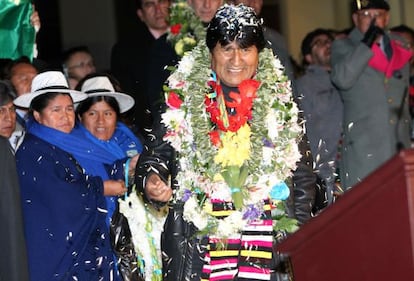OAS asks Spain and other countries to apologize to Bolivia
Spanish representative calls meeting “a show” while Italy warns of "serious consequences"

The Organization of American States (OAS) late Tuesday asked the governments of Spain, Portugal, Italy and France to apologize for their roles in last week's delay of Bolivian President Evo Morales' plane on his return flight from Moscow.
Portugal, Italy and France had closed off their airspace to Morales because they believed that he was carrying wanted US national intelligence contractor Edward Snowden, who is believed to be still holed up at Moscow's Sheremetyevo Airport, where he arrived on June 23.
Spain said that it didn't bar the presidential plane from its airspace but Morales has charged that the Spanish ambassador in Austria demanded to search it as a condition of using the Canary Islands as a stopover for refueling.
The four countries, as well as the European Union, hold permanent observer status in the Washington-based regional body.
The OAS permanent council met in a special session at the request of Bolivia, Venezuela, Nicaragua and Ecuador. In its resolution, the OAS "strongly calls upon the governments of France, Portugal, Italy and Spain to provide the necessary explanations about the events" involving Morales, "as well as the corresponding apologies."
Spain and Italy didn't attempt to disguise their anger over the resolution. Jorge Hevia, the Spanish observer, suggested that the text of the document was already approved before the debate because it did not take into consideration the explanations that the four countries have offered Bolivia. "I get the impression that this was nothing but a show," Hevia said about the meeting.
"The text makes inaccurate conclusions when it refers to the cancelation of the flight and a delay in the authorization permits – things the Spanish government never did," he said.
In a stronger tone, which surprised many of the delegates, Italian observer Sebastiano Fulci said that there would be consequences from the OAS resolution.
"The OAS is a courtroom that found us guilty beforehand. This is very serious and my government will answer this," Fulci said.
The resolution was hammered out after a long closed-door session with arguments split among ideological lines. The leftist nations, which asked for the special meeting, said that the European nations were pressured by the United States to delay Morales' plane for nearly 14 hours on July 2.
The United States and Canada accomplished getting a footnote included in the document expressing their disagreement, and pointing out that it was "not appropriate" for the OAS to issue resolutions on events that have not been sufficiently clarified.
Roberta Jacobson, the US ambassador to the OAS, noted that airspace usage is a decision that is taken by individual nations and has nothing to do with other countries.
Bolivian Minister Carlos Romero, who serves as Morales' chief of staff, said that the president "was kidnapped" when he was forced to land in Vienna after France closed off its airspace. "We won't be intimidated," he said.
France, for its part, called the decision to prohibit Morales from flying over French territory "a mistake."
Tu suscripción se está usando en otro dispositivo
¿Quieres añadir otro usuario a tu suscripción?
Si continúas leyendo en este dispositivo, no se podrá leer en el otro.
FlechaTu suscripción se está usando en otro dispositivo y solo puedes acceder a EL PAÍS desde un dispositivo a la vez.
Si quieres compartir tu cuenta, cambia tu suscripción a la modalidad Premium, así podrás añadir otro usuario. Cada uno accederá con su propia cuenta de email, lo que os permitirá personalizar vuestra experiencia en EL PAÍS.
¿Tienes una suscripción de empresa? Accede aquí para contratar más cuentas.
En el caso de no saber quién está usando tu cuenta, te recomendamos cambiar tu contraseña aquí.
Si decides continuar compartiendo tu cuenta, este mensaje se mostrará en tu dispositivo y en el de la otra persona que está usando tu cuenta de forma indefinida, afectando a tu experiencia de lectura. Puedes consultar aquí los términos y condiciones de la suscripción digital.









































